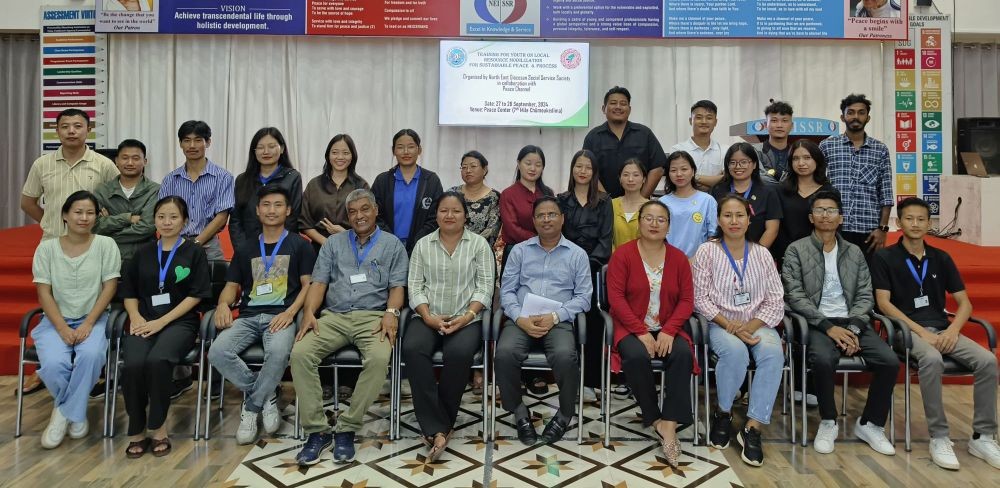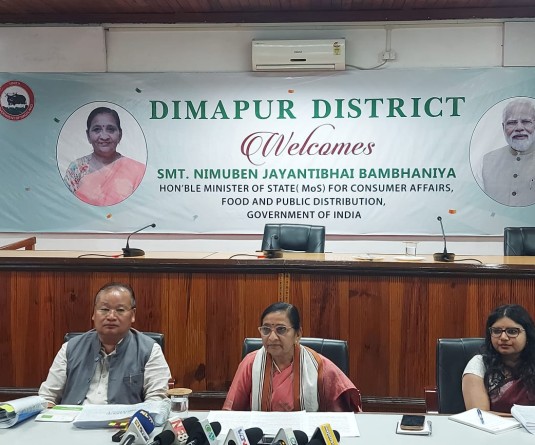The Peace Channel, in collaboration with the NEISSR conducted a five-day training program on peace building at the Peace Centre in Chümoukedima.

CHÜMOUKEDIMA, OCTOBER 27 (MExN): The Peace Channel, in collaboration with the North East Institute of Social Sciences and Research (NEISSR), recently conducted a comprehensive five-day training program focused on peace building at the Peace Centre in Chümoukedima. Running from October 21 to 25, the program attracted a diverse group of participants, including youth leaders and Master of Social Work (MSW) students from various backgrounds, a press release issued by Peace Channel Desk informed.
The training was designed to equip participants with essential skills for facilitating peace initiatives and enhancing their personal growth. Covering nine comprehensive modules, the program addressed key areas such as Facilitation Skills, Peer Mediation, Peace Club Functioning, Dialogue and Mediation, Teachers Training, Career Guidance, Livelihood Sustainability Skills, and Employability Skills.
The event commenced on October 21 with an opening prayer led by Besa. Project Coordinator James Phanungkiu provided an overview of the training schedule, highlighting the various modules planned for the week. Dr Fr C.P Anto, Director of Peace Channel and Principal of NEISSR, delivered a keynote address, welcoming the participants and emphasizing the importance of actively engaging in the training. He noted that the purpose of the program was not just to acquire knowledge but to foster connections and collaborations among participants.
Dr Anto encouraged attendees to approach the training with an open mind, sharing experiences and asking questions. He reminded them of their shared goal: to enhance their skills and create positive change in society. The director's motivational words resonated with the participants, setting the stage for a week filled with learning and interaction.
The training structure combined theory and practical sessions, enabling participants to actively engage with the content. They were divided into groups known as COHORTs, where they prepared presentations on the topics discussed during the training. This collaborative format promoted active listening, discussion, and the sharing of ideas.
Expert facilitators led various sessions throughout the week. On the second day, the training focused on peer mediation, emphasizing practical approaches to conflict resolution. Participants discussed the causes of conflict and learned about the peer mediation process, which includes steps such as Introduction, Discussion, and Resolution. Role-playing scenarios allowed them to practice these skills in a supportive environment.
The importance of time management was also highlighted during the training, as many participants shared their challenges in balancing commitments. This led to discussions on career pathways and the need for meaningful employment among youth. Jiji Joseph, Senior Program Officer at the Development Association of Nagaland spoke on the significance of pursuing sustainable livelihoods, encouraging participants to explore traditional crafts, agriculture, and modern skills like social media management.
The training sessions included insights into agricultural entrepreneurship and government support schemes, allowing participants to understand how these initiatives can contribute to peace building. Dr Robin, Assistant Professor at NEISSR, presented various schemes that assist farmers, helping participants see the connection between economic stability and social harmony.
The program emphasized personal development, with Dr Anto leading a session on peace retreats. He discussed the interconnectedness of body, mind, and soul and the role of inner peace in effective conflict resolution. Participants were encouraged to set SMART goals—Specific, Measurable, Achievable, Relevant, and Time-bound—to help them achieve personal and community-oriented objectives.
On the final day, the training culminated in a valedictory function where participants reflected on their experiences. Dr Anto congratulated them on their commitment to becoming peace builders and emphasized the importance of applying the skills learned in real-life scenarios. Certificates and peace badges were presented, marking the successful completion of the training.
The Peace Channel's initiative demonstrates a strong commitment to fostering personal growth and community engagement through skill development in peace building. Participants left the training equipped not only with knowledge but also with practical skills to implement in their respective communities, aiming to promote peace and positive change, the press release maintained.





